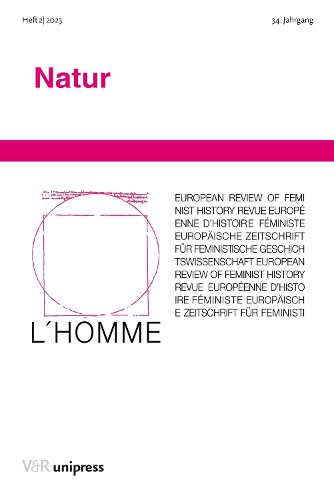Readings Newsletter
Become a Readings Member to make your shopping experience even easier.
Sign in or sign up for free!
You’re not far away from qualifying for FREE standard shipping within Australia
You’ve qualified for FREE standard shipping within Australia
The cart is loading…






Fuer die Kritik der modernen Geschlechterordnung war und ist die Kritik an Naturbezuegen zentral - zugespitzt im Argument, das vermeintlich Natuerliche sei ganz und gar kulturell und die Geschlechterordnung (ja, die Geschlechtlichkeit selbst) infolgedessen vollstaendig sozial konstruiert. Aus dieser Perspektive steht jedes Argumentieren mit Natur grundsaetzlich unter Essentialismusverdacht. In der historischen Arbeit entpuppt sich diese Kritik zunehmend als vorschnelle Begrenzung - wenn naemlich nicht auch danach gefragt werden kann, worum es Akteur*innen eigentlich geht, wenn sie von "Natur" reden, oder wenn ein Naturbegriff absolut gesetzt wird, der selbst historisch ist. Im vorliegenden Heft werden solche Fragen anhand historischer Fallstudien von der Antike bis ins fruehe 20. Jahrhundert diskutiert.
Aus dem Inhalt: Die Rolle der Inkas in Guaman Pomas Geschichte der Anden / Carolyn Merchants "Death of Nature" und sozio-oekologische Utopien der Fruehen Neuzeit / Tierische Beziehungen / Schweizer Naturforscher in Niederlaendisch-Ostindien / German-Speaking Merchants on Honour and Manhood / Vormoderne Geschlechtsidentitaeten in Frage stellen? / Die Verkoerperung der Natur und der natuerliche Koerper in Plinius? "Naturalis historia" / Menschen sind auch Muetter / The Nature of the Posthuman: Rosi Braidotti and the Resurrection of Ecofeminismian language?
"Nature" and its presumed opposite, "culture" are central categories when examining the modern order of the sexes. A central argument has long been that what is supposedly "natural" might actually be entirely "cultural" and that the "natural" gender order and even gender itself is, indeed, socially constructed. Any reference to "nature" has thus been fundamentally subjected to a suspicion of essentialism, leading to to harsh feminist critiques of intellectual currents such as "ecofeminism" or "feminism of difference". This binary way of thinking, however, seems to bear in it an unproductive limitation of research. It becomes impossible to ask what historical actors are doing when they use the term "nature" and it makes the concept of nature absolute, rather than showing it to be the subject to considerable historical change. This issue discusses questions of the contingency of nature and its relationship with gender along various historical settings, thus making an important contribution to our current debate on "nature", culture and the gendered order of society.
$9.00 standard shipping within Australia
FREE standard shipping within Australia for orders over $100.00
Express & International shipping calculated at checkout
Fuer die Kritik der modernen Geschlechterordnung war und ist die Kritik an Naturbezuegen zentral - zugespitzt im Argument, das vermeintlich Natuerliche sei ganz und gar kulturell und die Geschlechterordnung (ja, die Geschlechtlichkeit selbst) infolgedessen vollstaendig sozial konstruiert. Aus dieser Perspektive steht jedes Argumentieren mit Natur grundsaetzlich unter Essentialismusverdacht. In der historischen Arbeit entpuppt sich diese Kritik zunehmend als vorschnelle Begrenzung - wenn naemlich nicht auch danach gefragt werden kann, worum es Akteur*innen eigentlich geht, wenn sie von "Natur" reden, oder wenn ein Naturbegriff absolut gesetzt wird, der selbst historisch ist. Im vorliegenden Heft werden solche Fragen anhand historischer Fallstudien von der Antike bis ins fruehe 20. Jahrhundert diskutiert.
Aus dem Inhalt: Die Rolle der Inkas in Guaman Pomas Geschichte der Anden / Carolyn Merchants "Death of Nature" und sozio-oekologische Utopien der Fruehen Neuzeit / Tierische Beziehungen / Schweizer Naturforscher in Niederlaendisch-Ostindien / German-Speaking Merchants on Honour and Manhood / Vormoderne Geschlechtsidentitaeten in Frage stellen? / Die Verkoerperung der Natur und der natuerliche Koerper in Plinius? "Naturalis historia" / Menschen sind auch Muetter / The Nature of the Posthuman: Rosi Braidotti and the Resurrection of Ecofeminismian language?
"Nature" and its presumed opposite, "culture" are central categories when examining the modern order of the sexes. A central argument has long been that what is supposedly "natural" might actually be entirely "cultural" and that the "natural" gender order and even gender itself is, indeed, socially constructed. Any reference to "nature" has thus been fundamentally subjected to a suspicion of essentialism, leading to to harsh feminist critiques of intellectual currents such as "ecofeminism" or "feminism of difference". This binary way of thinking, however, seems to bear in it an unproductive limitation of research. It becomes impossible to ask what historical actors are doing when they use the term "nature" and it makes the concept of nature absolute, rather than showing it to be the subject to considerable historical change. This issue discusses questions of the contingency of nature and its relationship with gender along various historical settings, thus making an important contribution to our current debate on "nature", culture and the gendered order of society.